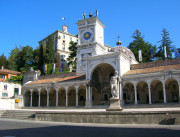
Udine is the historical capital of Friuli. The area was inhabited since the Neolithic age, and was later, most likely, settled by Celts. After the fall of the Western Roman Empire, the area increased of importance after the decline of Aquileia and afterwards of Cividale also.
In 983 AD Udine is mentioned for the first time, with the donation of the Utinum castle by emperor Otto II to the Patriarchs of Aquileia, then the main feudal lords of the region. In 1223, with the foundation of the market, the city became finally the most important in the area for economy and trades, and also became the Patriarch's seat.
In 1420 it was conquered by the Republic of Venice. In 1511 it was the seat of a short civil war, which was followed by an earthquake and a plague. Udine remained under Venetian control until 1797, being the second largest city in the state. After the short French domination which ensued, it was part of the Austrian-puppet Lombardy-Venetia Kingdom, and was included in the newly formed Kingdom of Italy in 1866.
During World War I, after the defeat in the battle of Caporetto, Udine became the seat of the Italian High Command and was nicknamed "Capitale della Guerra" ("War Capital"). After the war it was made capital of a short-lived province (Provincia del Friuli) which included the current provinces of Gorizia, Pordenone and Udine.
After September 8, 1943, when Italy surrendered to the Allies in World War II, the city was under direct German administration, which ceased in April 1945.